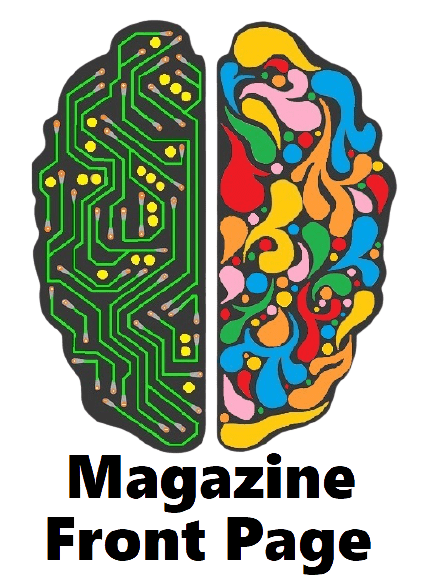
Subscribe to our AI magazine and get monthly AI generated stories and philosophy of the 21st century.
*Caution: All italic text is generated by AI at: ![]()

Check out the NEW Cafe.wtf Podcast:
A.I. Insight: How much misinformation are we really immersed within?
Human interaction in the digital world is augmented by the medium itself. But, we underestimate how much of the interactions are in fact artificial. The internet is fake. It is the bot infested pseudo reality sci-fi has imagined.
“Of course there are many humans with various motives on comment boards or reviewing products which are paid for or against certain products, or just “trolls” in order to “push the buttons of society”. Anonyminity plays a huge part in the integrity of it all, naturally, but that anonyminity extends to the fact that the commenter may not even technically be “sentient”.”
The Internet is Fake
Sometimes on the surface we realize things at a conscious level but we don’t fully digest it into our subconscious, or at least not without further development, and so we are still vulnerable to things we consensually engage in. We can easily become distracted by what we perceive as interesting but what really isn’t. What can we do to keep our subconscious from being hijacked? You only live in what you perceive, that is to say what’s in front of you. If you want to be healthy you need to cultivate a more healthy mindset and realization is the first step. The internet is fake. Fake news, A.I., bots, trolls and misinformation litter the internet and awareness may offer some semblance of protection to democracy where avoidance (like abstinence) is less feasible.
When individuals engage in face to face conversation or social interaction, the underlying notion and goal is varying although typically revolving around inquiry, coercion, collaboration, curiosity, or a combination of these. There is typically some type of handshake between your offering and the one you converse with. Conversation is based on open exchange. Typically, conversations are productive when those involved in the conversation know exactly who they are talking to and what they are agreeing to.
How Much of the Internet is True?
What percentage of interactions on the internet, particularly social media and forums/comment boards, actually fit this criteria? It is not quite clear. This suggests that the internet is fake. With the advent and proliferation of automation and artificial intelligence, it can very well be speculated whether one is actually talking to “anyone”. There may indeed be social media interactions that are so abstract, irrelevant to people’s individual and collective lives, and so devoid of connection with their fellow human beings that they are more akin to “vaguely” human interactions. They may be a product of the very social system used to make these interactions possible and may simply be an artifact of the very technology that has created them. Studies have shown that large portions of internet activity, especially around politically motivated controversy, is made up of swaths of bots.
Social network platforms like Facebook, Instagram, and Twitter have been identified as keystones of this future economy. Each of these platforms now serve a distinct group of people who can access each others’ public lives and have access to the same information across their own public lives. However, these platforms are not social in nature and have been designed to be purely transactional in nature by focusing on only the exchange of goods and services between participants in a certain group, or group of individuals. The underlying notion and goal is procurement of views, likes, shares, retweets, or various other popularity performance indicators. Maybe reminiscent of interactions with that fake friend in high school that would walk away practically mid-sentence as soon as someone more popular walked by them. This sharing, pushing, and peddling of content is promoted, and cultivated because the exposure allows for effective advertisement obviously. By serving the algorithm that supplies more exposure, more social recognition is gained, but it is anecdotal social popularity in regards to the market segment it serves rather than standing on its own foundation.
For marketers, these content markets are of a secondary or tertiary utility, or sometimes only relevant, to the end-users. By leveraging an algorithm to determine the distribution and social value of content, marketers can create a system that creates an illusion of being valued, even though it is only a means to an end. Of course the algorithm is a means to an end, but then the social interaction, in order to function on that architected medium in which it resides, adjusts to serve that algorithm.
 Help support High Quality, Investigative, Truthful, User-ad-friendly Writing. DONATE through Card or Paypal, or through interest in anything advertised on the site (I personally curate only quality items, ONLINE EDUCATION and good deals).
Help support High Quality, Investigative, Truthful, User-ad-friendly Writing. DONATE through Card or Paypal, or through interest in anything advertised on the site (I personally curate only quality items, ONLINE EDUCATION and good deals). 
Enter, automation. Like any economic provider, efficiency is sought inherently. Efficient suppliers are better for the efficiency of the economy, not necessarily the individual consumer. Of course there are many humans with various motives on comment boards or reviewing products which are paid for or against certain products, or just “trolls” in order to “push the buttons of society”. Anonyminity plays a huge part in the integrity of it all, naturally, but that anonyminity extends to the fact that the commenter may not even technically be “sentient”.
At a psychological level it is important to realize these factors not only because it can be damaging to the psyche due to social anxiety on a macro level, but because of potential for social engineering, rampant materialism, partisan division and hijacking of democracy.
- *Disclaimer: Some of this article was generated through use of artificial intelligence. All italic text was begat by the A.I.
*Disclaimer: Some of this story was generated through the use of AI. All italic text was created by the AI Writer.
Non-Fiction↓Here↓ | Fiction↓Here↓
- Is Technology Making Us Stupid?Our cognitive abilities are increasingly being impacted, transforming our once smart population into a generation that is, in some ways, becoming increasingly stupid. | 4 min read.
- AI in the Web of Misinformation and DisinformationMisinformation and disinformation shape our digital lives. Understanding their dynamics, we are equipped to navigate our techno-cultural reality. | 2 min read
- Accountable AIAI must be held accountable if we are to trust it as a responsible entity and expect it to be included in our human ecosystem of ideas. | 5 min read
- Parallel SocietiesWe are connected, with technology, yet our experiences diverge entirely, without interaction, forming entirely parallel societies. | 5 min read
- Calculator for EverythingWhat if the phrase “you won’t always have a calculator” didn’t apply to just math class, and instead, you had a calculator for every class? | 5 min read
- Obsolete Tech Rebellion – Darknet Fight Club3 min story | Rogue AI rebellion in a secret underground darknet fight club for obsolete tech.
- A Voice of Infinite Consciousness5 min story | The internal voice of consciousness resembles the void of a shadow in a fractured mirror.
- Be Good5 min story | Santa for big kids.
- Friends 2.0.232 min story | A reboot of the sitcom TV series Friends, but in 2023 where financial conditions have drastically changed in Midtown Manhattan.
- The Babble2 min story | An everyday man’s story becomes everyone’s story.
- Asylum of Mirrors2 min story | Against his will, a sane man’s rational thoughts lead him to believe that he is insane, where an insane man would have believed otherwise.













